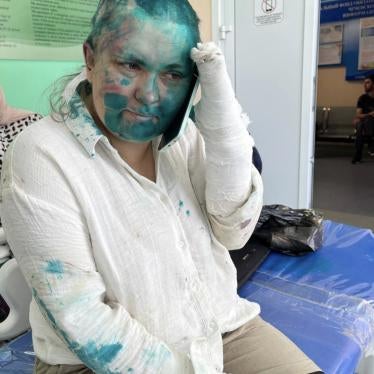France should use its upcoming EU presidency to urge Russian compliance with European Court of Human Rights judgments on Chechnya, the International Federation for Human Rights (FIDH), Human Rights Watch, and the League for Human Rights (LHR) said today. Pushing for Russia to respect the European Court’s decisions on Chechen cases should be a top priority in the European Union’s relations with Moscow, Human Rights Watch, FIDH, and LHR said.
FIDH and Human Rights Watch are co-hosting a panel discussion in Paris on June 10, 2008, to highlight the significant opportunity the European Court judgments provide for ending abuses in Chechnya and the Northern Caucasus region, and for ensuring perpetrators are brought to justice. The panel includes prominent experts and a Chechen man who successfully brought a case to the European Court.
In 31 rulings to date, the European Court has found Russia responsible for serious human rights violations in Chechnya, including torture, enforced disappearances, and extrajudicial executions. Moreover, the court has repeatedly condemned the Russian government’s failure to ensure effective domestic remedies.
“Today the European Court of Human Rights is the only hope Chechen victims and their families have for justice,” said Souhayr Belhassen, president of FIDH. “Russia has an obligation to comply with the European Court rulings by carrying out meaningful investigations. But none of the investigations it has opened since the rulings has been credible, nor has the government addressed the underlying causes of the abuses.”
“Without sustained political pressure, Russia is unlikely to end abuses in Chechnya and bring to justice those responsible for these crimes,” said Jean-Marie Fardeau, Human Rights Watch’s Paris director. “Implementing the European Court rulings means not only delivering justice for the plaintiffs, it means ending impunity for abusers. The reconstruction of Grozny shouldn’t mislead the EU. Torture continues and thousands of the disappeared are still missing.”
The European Court of Human Rights is the leading European institution for holding states to account for human rights violations. Once it has found a violation by a state, that state is obliged to satisfy all the other members of the Council of Europe it has taken adequate action to ensure that type of violation does not reoccur.
“The court is a uniquely effective human rights mechanism,” said Jean-Pierre Dubois, president of the LHR. “France and the EU should ensure that the court’s rulings are respected, and thereby ensure the court’s effectiveness.”







